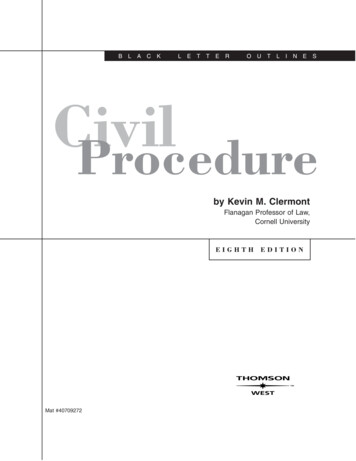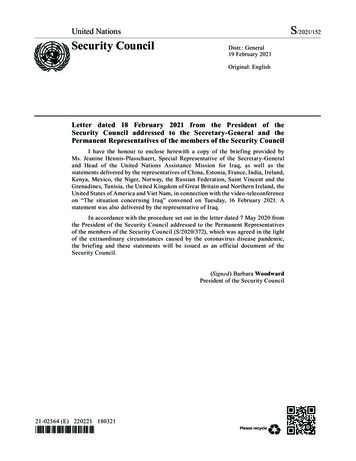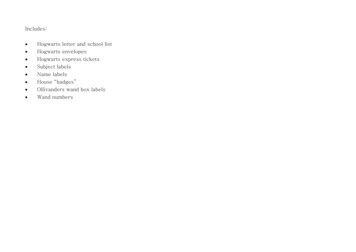![[Dedicatory Letter To The Sorbonne]](/img/13/descartes-meditations-i-iii.jpg)
Transcription
[Dedicatory letter to the Sorbonne]To those most learned and distinguished men, the Dean and Doctorsthe sacred Faculty of Theology at Paris, from Rene Descartes.I have a very good reason for offering this book to you, and I amconfident that you will have an equally good reason for giving it yourprotection once you understand the principle behind my undertaking; somuch so, that my best way of commending it to you will be to tell youbriefly of the goal which I shall be aiming at in the book.I have always thought that two topics - namely God andsoul - areprime examples of subjects where demonstrative proofs ought to be givenwith the aid of philosophy rather than theology. For us who are believers,it is enough to accept on faith that the human soul does not die with thebody, and that God exists; but in the case of unbelievers, it seems thatthere is no religion, and practically no moral virtue, that they can bepersuaded to adopt until these two truths are proved to them by naturalreason. And since in this life the rewards offered to vice are often greaterthan the rewards of virtue, few people would prefer what is right to whatis expedient if they did not fear God or have the expectation of anafter-life. It is of course quite true that we must believe in the existence ofGod because it is a doctrine of Holy Scripture, and conversely, that wemust believe Holy Scripture because it comes from God; for since faith isthe gift of God, he who gives us grace to believe other things can also giveus grace to believe that he exists. But this argument cannot be put tounbelievers because they would judge it to be circular. Moreover, I havenoticed both that you and all other theologians assert that the existenceof God is capable of proof by natural reason, and also that the inferencefrom Holy Scripture is that the knowledge of God is easier to acquire thanthe knowledge we have of many created things - so easy, indeed, thatthose who do not acquire it are at fault. This is clear from a passage in theBook of Wisdom, Chapter I 3: 'Howbeit they are not to be excused;iftheir knowledge was so great that they could value this world,didthey not rather find out the Lord thereof?' And in Romans, Chapter 1 it issaid that they are 'without excuse'. And in the same place, in the passage'that which is known of God is manifest in them', we seem to be told thateverything that may be known of God can be demonstrated by reasoningwhich has no other source but our own mind. Hence I thought it was3ATVHI2
4Meditationsnn First Philosophyquite proper for me to inquire how this may be, and how God may bemore easily and more certainly known than the things of this world.3As regards the soul, many people have considered that it is not easy todiscover its nature, and some have even had the audacity to assert that, asfar as human reasoning goes, there are persuasive grounds for holdingthat the soul dies along with the body and that the opposite view is basedon faith alone. But in its eighth session the Lateran Council held underLeo X condemned those who take this position, 1 and expressly enjoinedChristian philosophers to refute their arguments and use ail their powersto establish the truth; so l have not hesitated to attempt this task as well.In addition, I know that the only reason why many irreligious peopleare unwilling to believe that God exists and that the human mind isdistinct from the body is the a!ieged fact that no one has hitherto beenable to demonstrate these points. Now I completely disagree with this: Ithink that when properly understood almost all the arguments that havebeen put forward on these issues by the great men have the force ofdemonstrations, and I am convinced that it is scarcely possible to provideany arguments which have not already been produced by someone else.Nevertheless, I think there can be no more useful service to be rendered inphilosophy than to conduct a careful search, once and for all, for the bestof these arguments, and to set them out so precisely and clearly as toproduce for the future a general agreement that they amount todemonstrative proofs. And finally, I was strongly pressed to undertakethis task by several people who knew that I had developed a method forresolving certain difficulties in the sciences - not a new method (fornothing is older than the truth), but one which they had seen me use withsome success in other areas; and I therefore thought it my duty to makesome attempt to apply it to the matter in hand.4The present treatise contains everything that I have been able toaccomplish in this area. Not that I have attempted to collect here all thedifferent arguments that could be put forward to establish the sameresults, for this does not seem worthwhile except in cases where no singleargument is regarded as sufficiently reliable. What I have done is to takemerely the principal and most important arguments and develop them insuch a way that I would now venture to put them forward as very certainand evident demonstrations. I will add that these proofs are of such akind that I reckon they ieave no room for the possibility that the humanmind will ever discover better ones. The vital importance of the cause andthe glory of God, to which the entire undertaking is directed, herecompel me to speak somewhat more freeiy about my own achievementsIThe Lateran Council ofimmortality.I513 condemned the Averroist heresy which denied personal
Letier to the Sorbonne5than is my custom. But although I regard the proofs as quite certain andevident, I cannot therefore persuade myself that they are suitable to begrasped by everyone. In geometry there are many writings left byArchimedes, Apollonius, Pappus and others which are accepted byeveryone as evident and certain because they contain absolutely nothingthat is not very easy to understand when considered on its uwn, and eachstep fits in precisely with what has gone before; yet because they aresomewhat long, and demand a very attentive reader, it is only comparatively fevv people who understand them. In the same way, although theproofs I employ here are in my view as certain and evident as the proofsof geometry, if not more so, it will, I fear, be impossible for many peopleto achieve an adequate perception of them, both because they are ratherlong and some depend on others, and also, above all, because theyrequire a mind which is completely free from preconceived opinions andwhich can easily detach itself from involvement with the senses. Moreover, people who have an aptitude for metaphysical studies are certainlynot to be found in the world in any greater numbers than those who havean aptitude for geometry. What is more, there is the difference that ingeometry everyone has been taught to accept that as a rule no proposition is put forward in a book without there being a conclusivedemonstration available; so inexperienced students make the mistake ofaccepting what is false, in their desire to appear to understand it, moreoften than they make the mistake of rejecting what is true. In philosophy,by contrast, the belief is th:1t everything can be argued either vvay; so fewpeople pursue the truth, while the great majority build up their reputation for ingenuity by boldly attacking whatever is most sound.Hence, whatever the quality of my arguments may be, because theyhave to do with philosophy I do not expect they will enable me to achieveany very worthwhile result-s unless you come to my aid by granting meyour patronage. 1 The reputation of your Faculty is so firmly fixed in theminds of all, and the name of the Sorbonne has such authority that, withthe exception of the Sacred Councils, no institution carries more weightthan yours in matters of faith; while as regards human philosophy, youare thought of as second to none, both for insight and soundness and alsofor the integrity and wisdom of your pronouncements. Because of this,the results of your careful attention to this book, if you deigned to give it,would be threefold. First, the errors in it would be corrected - for when Iremember not only that I am a human being, but above all that l am anignorant one, I cannot claim it is free of mistakes. Secondly, any passages1Although the tide page of the first edition of the Meditations carries the words 'with theapproval of the learned doctors', Descarces never in fact obtained the endorsement fromthe Sorbonne which he sought.5
6Meditations on First Philosophywhich are defective, or insufficiently developed or requmng furtherexplanation, would be supplemented, completed and clarified, either byyourselves f .- by me after you have given me your advice. And lastly, oncethe argume1 ts in the book proving that God exists and that the mind isdistinct from the body have been brought, as I am sure they can be, to6 such a pitch of clarity that they are fit to be regarded as very exactdemonstrations, you may be willing to declare as much, and make apublic statement to that effect. If all this were to happen, I do not doubtthat all the errors which have ever existed on these subjects would soonbe eradicated from the minds of men. In the case of all those who shareyour intelligence and learning, the truth itself will readily ensure that theysubscribe to your opinion. As for the atheists, who are generally posersrather than people of real intelligence or learning, your authority willinduce them to lay aside the spirit of contradiction; and, since they knowthat the arguments are regarded as demonstrations by all who areintellectually gifted, they may even go so far as to defend them, ratherthan appear not to understand them. And finally, everyone else willconfidently go along with so many declarations of assent, and there willbe no one left in the world who will dare to call into doubt either theexistence of God or the real distinction between the human soul andbody. The great advantage that this would bring is something which you,in your singular wisdom, are in a better position to evaluate thananyone; 1 and it would ill become me to spend any more time commending the cause of God and religion to you, who have always been thegreatest tower of strength to the Catholic Church.Pref ace to the reader 27I briefly touched on the topics of God and the human mind in myDiscourse on the method of rightly conducting reason and seeking thetruth in the sciences, which was published in French in I 6 3 7. My purposethere was not to provide a full treatment, but merely to offer a sample,and learn from the views of my readers how I should handle these topicsat a later date. The issues seemed to me of such great importance that Iconsidered they ought to be dealt with more than once; and the routewhich I follow in explaining them is so untrodden and so remote fromthe normal way, that I thought it would not be helpful to give a fullI2.'lt is for you to judge the advantage that would come from establishing these beliefsfirmly, since you see all the disorders which come from their being doubted' (Frenchversion).The French version of 164 7 does not translate this preface, but substitutes a briefforeword, Le Libraire au Lecteur ('The Publisher to the Reader'), which is probably notby Descartes.
Pref ace to the reader7account of it in a book written in French and designed to be read by alland sundry, in case weaker intellects might believethey ought to setout on the same path.In the Discourse I asked anyone who found anything worth criticizingin what I had written to be kind enough to point it out to me. 1 In the caseof my remarks concerning God and the soul, only two objections worthmentioning were put to me, which I shall now briefly answer beforeembarking on a more precise elucidation of these topics.The first objection is this. From the fact that the humandirected towards itself, does not perceive itself to be8a thinking thing, it does not follow that its nature or essence consists onlyin its being a thinking thing, where the word 'only' excludes everythingelse that could be said to belong to the nature of the soul. My answer tothis objection is that in that passage it was not my intention to makethose exclusions in an order corresponding to the actual truth of thematter (which I was not dealing with at that stage) but merely in an ordercorresponding to my own perception. So the sense ofpassage wasthat I was aware of nothing at all that I knew belonged to my essence,except that I was a thinking thing, or a thing possessing within itself thefaculty of thinking. 2 I shall, however, show below how it follows from thefact that I am aware of nothing else belonging to my essence, that nothingelse does in fact belong to it.The second objection is this. From the fact that I have within me anidea of a thing more perfect than myself, it does not foliow that theitself is more perfect than me, still less that what is representedtheidea exi::ts. My reply is that there is an ambiguity here in the word 'idea'.'Idea' can be taken materially, as an operation of the intellect, incase it cannot be said to be more perfect than me. Alternatively, it can betaken objectively, as the thing represented by that operation; and thisthing, even if it is not regarded as existing outside the intellect, can still, invirtue of its essence, be more perfect than myself. As to how, from themere fact that there is within me an idea of something more perfect thanme, it follows that this thing really exists, this is something which willfully explained below.Apart from these objections, there are two fairly lengthy essays which Ihave looked at, 3 but these did not attack my reasoning on these mattersso much as my conclusions, and employed arguments lifted from thestandard sources of the atheists. But arguments of this sort can carry no 912lSee Discourse, part 6: vol. 1, p. 149.See Discourse, part 4: vol. 1, p. 127.One of the critics referred to here is Petit: see letter to Mersenne of r 7 May r 6, 8. Theother is unknown.
810Meditationson First Philosophyweight with those who understand my reasoning. Moreover, the judgement of many people is so silly and weak that, once they have accepted aview, they continue to believe it, however faise and irrational it may be,in preference to a true and well-grounded refutation which they hearsubsequently. So I do not wish to reply to such arguments here, if only toavoid having to state them. I will only make the general point that all theobjections commonly tossed around by atheists to attack the existence ofGod invariably depend either on attributing human feelings to God or onarrogantly supposing our own minds to be so powerful and wise that wecan attempt to grasp and set limits to what God can or should perform.So, provided only that we remember that our minds must be regarded asfinite, while God is infinite and beyond our comprehension, suchobjections will not cause us any difficulty.But now that I have, after a fashion, taken an initial sample of people'sopinions, I am again tackiing the same questions concerning God and thehuman mind; and this time I am also going to deal with the foundationsof First Philosophy in its entirety. But I do not expect any popularapproval, or indeed any wide audience. On the contrary I would not urgeanyone to read this book except those who are able and willing tomeditate seriously with me, and to withdraw their minds from the sensesand from all preconceived opinions. Such readers, as I well know, are fewand far between. Those who do not bother to grasp the proper order ofmy arguments and the connection between them, but merely try to carpat individual sentences, as is the fashion, will not get much benefit fromreading this book. They may well find an opportunity to quibble in manyplaces, but it will not be easy for them to produce objections which aretelling or worth replying to.But 1 certainly do not promise to satisfy my other readers straightawayon all points, and I am not so presumptuous as to believe that I amcapable of foreseeing all the difficulties which anyone may find. So first ofall, in the Meditations, I will set out the very thoughts which haveenabled me, in my view, to arrive at a certain and evident knowledge ofthe truth, so that I can find out whether the same arguments which haveconvinced me will enable me to convince others. Next, I will reply to theobjections of various men of outstanding intellect and scholarship whohad these Meditations sent to them for scrutiny before they went to press.For the objections they raised were so many and so varied that I wouldventure to hope that it will be hard for anyone else to think of any pointat least of any importance - which these critics have not touched on. Itherefore ask my readers not to pass judgement on the Meditations untilthey have been kind enough to read through all these objections and myreplies to them.
9Synopsis of the following six MeditationsI2In the First Meditation reasons are provided which give us possiblegrounds for doubt about all things, especially material things, so long aswe have no foundations for the sciences other than those which we havehad up till now. Although the usefulness of such extensive doubt is notapparent at first sight, its greatest benefit lies in freeing us from all ourpreconceived opinions, and providing the easiest route by which themind may be led away from the senses. The eventual result of this doubtis to make it impossible for us to have any further doubts about 'What wesubsequently discover to be true.In the Second Meditation, the mind uses its own freedom and supposesthe non-existence of all the things about whose existence it can have eventhe slightest doubt; and in so doing the mind notices that it is impossiblethat it should not itself exist during this time. This exercise is also of thegreatest benefit, since it enables the mind to distinguish without difficuitywhat belongs to itself, i.e. to an intellectual nature, from what belongs tothe body. But since some people may perhaps expect arguments for theimmortality of the soul in this section, I think they should be warned hereand now that I have tried not to put down anything which I could not I3precisely demonstrate. Hence the only order which I could follow wasthat normaliy employed by geometers, namely to set out all thepremisses on which a desired proposition depends, before drawing any ·conclusions about it. Now the first and most important prerequisite forknowledge of the immortality of the soul is for us to form a concept ofthe soul which is as dear as possible and is also quite distinct from everyconcept of body; and that is just what has been done in this section. Afurther requirement is that we should know that everything that wedearly and distinctly understand is true in a way which correspondsexactly to our understanding of it; but it was not possible to prove thisbefore the Fourth Meditation. In addition we need to have a distinctconcept of corporeal nature, and this is developed partly in the SecondMeditation itself, and partiy in the Fifth and Sixth Meditations. Theinference to be drawn from these results is that all the things that weclearly and distinctly conceive of as different substances (as we do in thecase of mind and body) are in fact substances which are really distinctone from the other; and this conclusion is drawn in the Sixth Meditation.This conclusion is confirmed in the same Meditation by the fact that wecannot understand a body except as being divisible, while by contrast wecannot understand a mind except as being indivisible. For we cannotconceive of half of a mind, while we can always conceive of haif of abody, however small; and this leads us to recognize that the natures of
IOMeditationson Firstmind and body are not only different, but in some way opposite. But Ihave not pursued this topic any further inbook, first because thesearguments are enough to show that the decaythe body does not implythe destruction of the mind, and are hence enough to give mortals thehope of an after-life, and secondly because the premisses which lead tothe conclusion that the soul is immortal depend on an account of the14 whole of physics. This is required for two reasons. First, we need to knowthat absolutely all substances, or things which must be created by God inorder to exist, are by their nature incorruptible and cannot ever cease toexist unless they are reduced to nothingness by God's denying hisconcurrence 1 to them. Secondly, we need to recognizebody, taken inthe general sense, is a substance, so that it too never perishes. But thehuman body, in so far as it differs from other bodies, is simply made upof a certain configuration of limbs and other accidents 2 of this sort;whereas the human mind is not made up of any accidents in this way, butis a pure substance. For even if all the accidents of the mind change, sothat it has different objects ofunderstanding and different desires andsensations, it does not on that account become a different mind; whereasa human body loses its identity merely as a result of a change in the shapeof some of its parts. And it follows from this that while the body can veryeasily perish, the mind 3 is immortal by its very nature.In the Third Meditation I have explained quite fully enough, I think,my principal argument for proving the existence of God. But in order todraw my readers' minds away from the senses as far as possible, I was notwilling to use any comparison taken from bodily things. So it may be thatmany obscurities remain; but I hope they will be completely removedlater, in my Replies toObjections. One such problem, among others,is how the idea of a supremely perfect being, which is in us, possesses somuch objective 4 reality that it can come only from a cause which issupremely perfect. In the Replies this is illustrated by the comparison of avery perfect machine, the idea of which is in the mind of some engineer. 5Just as the objective intricacy belonging to the idea must have somer The continuous divine action necessary to maintain things in existence; see below, FifthReplies pp. 254 .2 Descartes here uses this scholastic term to refer to those features of a thing which mayalter, e.g. the particular size, shape etc. of a body, or the particular thoughts, desires etc.of a mind.3 ' . or the soul of man, for l make no distinction between them' (added in Frenchversion).4 for Descartes' use of this term, see Med. Ill, below p. 28.5 first Replies, below p. 7 5.
SynopsisIIcause, namely the scientific knowledge of the engineer, or of someone elsewho passed the idea on to him, so the idea of God which is in us musthave God himself as its cause.In the Fourth Meditation it is proved that everything that we clearlyand distinctly perceive is true, and I also explain what the nature offalsity consists in. These results need to be known both in order toconfirm what has gone before and also to make intelligible what is tocome later. (But here it should be noted in passing that I do not deal at allwith sin, i.e. the error which is committed in pursuing good and evil, butonly with the error that occurs in distinguishing truth from falsehood.And there is no discussion of matters pertaining to faith or the conduct oflife, but simply of speculative truths which are known solely by means ofthe natural light.) 1In the Fifth Meditation, besides an account of corporeal nature takenin general, there is a new argument demonstrating the existence of God.Again, several difficulties may arise here, but these are resolved later inthe Replies to the Objections. Finally I explain the sense in which it is truethat the certainty even of geometrical demonstrations depends on theknowledge of God.Lastly, in the Sixth Meditation, the intellect is distinguished from theimagination; the criteria for this distinction are explained; the mind isproved to be really distinct from the body, but is shown, notwithstanding, to be so closely joined to it that the mind and the body make up akind of unit; there is a survey of all the errors which commonly comefrom the senses, and an explanation of how they may be avoided; and,lastly, there is a presentation of all the arguments which enab1 sheexistence of material things to be inferred. The great benefit of t,1esearguments is not, in my view, that they prove what they establish namely that there really is a world, and that human beings have bodiesand so on - since no sane person has ever seriously doubted these things.The point is that in considering these arguments we come to realize thatthey are not as solid or as transparent as the arguments which lead us toknowledge of our own minds and of God, so that the latter are the mostcertain and evident of all possible objects of knowledge for the humanintellect. Indeed, this is the one thing that I set myself to prove in theseMeditations. And for that reason I will not now go over the various otherissues in the book which are dealt with as they come up.r Descartes added this passage after reading the Fourth Set of Objections (see below pp.r51-2). He told Mersenne 'please put the words in brackets so that it can be seen thatthey have been added' (letter of I 8 March r 641 ).I5I6
MED IT A TIO NS ON FIRST PHILOSOPHYin which are demonstrated the existence of God and thedistinction between the human soul and the bodyFIRST MEDITATIONWhat can be called into doubtSome years ago I was struck by the large number of falsehoods that I hadaccepted as true in my childhood, and by the highly doubtfui nature ofthe whole edifice that I had subsequently based on them. I realized that itwas necessary, once in the course of my life, to demolish everythingcompletely and start again right from the foundations if I wanted toestablish anything at all in the sciences that was stable and likely to last.But the task looked an enormous one, and I began to wait until I shouidreach a mature enough age to ensure that no subsequent time of lifewould be more suitable for tackling such inquiries. This led me to put theproject off for so long that I would now be to blame if by pondering overit any further I wasted the time still left for carrying it out. So today I18 have expressly rid my mind of all worries and arranged for myself a clearstretch of free time. I am here quite alone, and at last I will devote myself sincerely and without reservation to the general demolition of my opinions.But to accomplish this, it will not be necessary for me to show that allmy opinions are false, which is something I could perhaps never manage.Reason now leads me to think that I should hold back my assent fromopinions which are not completely certain and indubitable just ascarefully as I do from those which are patently false. So, for the purposeof rejecting all my opinions, it will be enough if I find in each of them atleast some reason for doubt. And to do this I will not need to run throughthem all individually, which would be an endless task. Once thefoundations of a building are undermined, anything built on themcollapses of its own accord; so I will go straight for the basic principleson which ali my former beiiefs n , ed.Whatever I have up till now accepted as most true I have acquiredeither from the senses or through the senses. But from time to time I havefound that the senses deceive, and it is prudent never to trmt completelythose who have deceived us even once.Yet although the senses occasionally deceive us with respect to objectswhich are very small or in the distance, there are many other beliefs about12
First MeditationI3which doubt is quite impossible, even though they are derived from thesenses - for example, that I am here, sitting by the fire, wearing a winterdressing-gown, hoiding this piece of paper in my hands, and so on.Again, how could it be denied that these hands or this whole body aremine? Unless perhaps I were to liken myself to madmen, whose brains are 19so damaged by the persistent vapours of melancholia that they firmlymaintain they are kings when they are paupers, or say they are dressed inpurple when they are naked, or that their heads are made of earthenware,or that they are pumpkins, or made of glass. But such people are insane,and I would be thought equally mad if I took anything from them as amodel for myself.A briiliant piece of reasoning! As if I were not a man who sleeps atnight, and regularly has all the same experiences I while asleep asmadmen do when awake - indeed sometimes even more improbableones. How often, asleep at night, am I convinced of just such familiarevents - that 1 am here in my dressing-gown, sitting by the fire - when infact I am lying undressed in bed! Yet at the moment my eyes are certainlywide awake when I look at this piece of paper; I shake my head and it isnot asleep; as I stretch out and feel my hand I do so deliberately, and Iknow what I am doing. All this would not happen with such distinctnessto someone asleep. Indeed! As if I did not remember other occasionswhen I have been tricked by exactly similar thoughts while asleep! As Ithink about this more carefuliy, I see plainly that there are never any suresigns by means of which being awake can be distinguished from beingasleep. The resuit is that I begin to feel dazed, and this very feeling onlyreinfo,ces the notion that I may be asleep.Suppose then that I am dreaming, and that these particulars - that myeyes are open, that I am moving my head and stretching ol!t my hands are not true. Perhaps, indeed, I do not even have such hands or such abody at all. Nonetheless, it must surely be admitted that the visionswhich come in sleep are like paintings, which must have been fashionedin the likeness of things that are real, and hence that at least these generalkinds of things - eyes, head, hands and the body as a whole - are things 20which are not imaginary but are real and exist. For even when painterstry to create sirens and satyrs with the most extraordinary bodies, theycannot give them natures which are new in all
6 Meditations on First Philosophy which are defective, or insufficiently developed or requmng further explanation, would be supplemented, completed and clarified, either by yourselves f .-by me after you have given me your advice. And lastly, once the argume1 ts
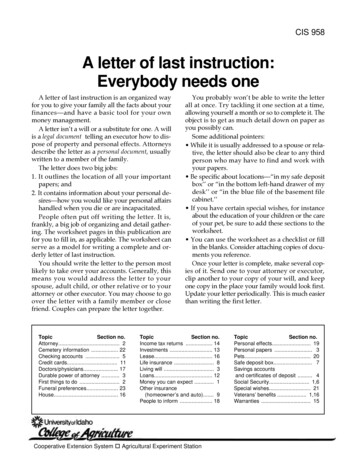
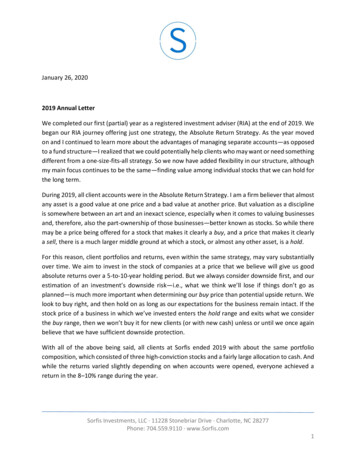

![Letter from Birmingham Jail (1963) [Abridged]](/img/2/1963-mlk-letter-abridged.jpg)




